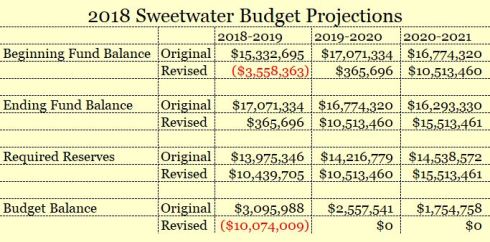By Thomas Ultican 3/14/2020
Chula Vista, California
Superintendent Karen Janney and the school board at Sweetwater Union High School District (SUHSD) have a target on their backs. In September 2018, new Chief Financial Officer, Jenny Salkeld, announced there was a $20 million dollar hole in the submitted 2018-2019 school year budget. Salkeld had discovered a long smoldering budget irregularity. Janney immediately reported the budget issue to the County Office of Education and informed the bargaining units with whom she was negotiating about the new uncertainties. Since then, journalists looking for readers and politicians looking for opportunities have robustly slimed the district and its leaders.
A Quadruple Whammy
Besides the mystery of going from a reported $17 million positive budget to an actual $10 million deficit, Janney and the board of trustees had to deal with the states increased pension payment requirements, a hike in special education costs and shrinking enrollment.
In the 2013-2014 school year, the state required school districts to pay 8% of teachers’ salaries to the California Teachers Retirement System (CalSTRS). In the just submitted Second Interim budget report, Salkeld revealed that the rate is now 17.1% and will increase to 18.4% in the 2020-2021 school year. In other words, the retirement costs have more than doubled.
This school year, spending on special education has zoomed to $62.5 million and is projected to reach almost $70 million in two years.
In addition, SUHSD is experiencing shrinking enrollment. Between 2014 and today the average daily attendance in the district has dropped from 38,302 to 36,023. That accounts for another $20 million in lost revenue. The drop is almost entirely fueled by the expanding charter school sector. In the 2018-2019 school year, 15% of 7th grade through 12th grade students in the Sweetwater service area were in charter schools; a total of 6,281 students. (Number of students derived by cross referencing county charter school data with state attendance records.)
With all of the turmoil, the fact that SUHSD has 13 high schools and 11 middle schools in excellent facilities with professional leadership and highly skilled educators is often overlooked. According to the state, 23% of the district’s students are English language learners and 60% are socioeconomically disadvantaged. What might surprise outsiders is that the professional educators in Sweetwater love their jobs, their students and their schools. They take great pride in the quality of education being provided and are not disturbed in the least by the learning challenges associated with these kinds of student demographics.
However the current situation has presented an opportunity for demagoguery. Chula Vista Elementary has for several years gotten around the law limiting them to grades K-6 by starting dependent charter schools. They now have five dependent charter schools educating 2,108 students who would otherwise be in SUHSD schools. A recent article in the San Diego Union reports “Chula Vista district leaders say they want to give parents more options for middle school as soon as this July.” They want to steal more students.

Comparing the June 2018 Budget with the Revised October 2018 Budget
Is it Time to Replace Karen Janney?
In April of 2014, four of the five Sweetwater board members (Jim Cartmill, Bertha Lopez, Pearl Quinones and Arlie Ricasa) plus Superintendent Jesus Gandara pled guilty to corruption charges and resigned. This is when the current SUHSD board of Trustees was originally elected. On June 8, 2015 the board selected Karen Janney to be the new permanent Superintendent of the district.
Janney was born and raised in the district. She began teaching in SUHSD in 1978 and soon became an administrator. When Jesus Gandara was appointed Superintendent in 2006, Janney was serving as Assistant Superintendent of schools. By 2009, she had completed her doctorate in Education Leadership and Administration at San Diego State University (SDSU) and had been forced out of the SUHSD by Superintendent Gandara.
Janney had many friends in the district who were excited by her selection as the new superintendent. I was working at Mar Vista High School at the time and vividly recall how two staff members that were taking her education leadership course at SDSU were absolutely thrilled. I was OK with her selection but had some unfounded reservations that I kept to myself.
I soon became troubled by three different Janney agendas. I was bothered when she found funding to buy tee-shirts for all staff. The shirts had “Sweetwater Union High School District Putting Students First” emblazoned across the front. Though not mandated, there was pressure applied to wear these corporate styled promotional tee-shirts on certain days. It reminded me of the corporate approach to leadership employed by large charter school chains.

Corporate Type of Promotion Foisted on SUHSD Teachers
A second and more troubling policy change came a few months into her tenure. Janney announced that Sweetwater was joining the Core Districts. Originally conceived as an organization for leaders in urban school districts to share strategies, CORE gained notoriety when its eight districts led by John Deasy of Los Angeles Unified made a legally questionable side deal with US Secretary of Education Arne Duncan. They agreed to evaluate teachers using testing data for a chance at Race to the Top grants. Today, CORE is offering to conduct school evaluations for California districts using the residual-gain growth model as an alternative to the California Department of Education evaluation method.
Worse – in 2017, Janney scrapped the district’s expensive I-pad program and replaced it with another Ed Tech industry scheme for putting students at glowing screens. She purchased laptop computers for all students and staff. She had succumbed to the allure of education technology and its associated bad pedagogy. Janney also signed the Future Ready pledge making SUHSD a target for education technology salesmen.
Since the budget crisis began, it has become apparent that Janney is incapable of creating a good working relationship with the County Office of Education (COE). It may not be all her fault. She has been careful to legally comply with the COE but has not developed any visible cooperative relationships.
Superintendents are in charge. School boards only approve or disapprove of the agenda set before them by the Superintendent. From the beginning of her administration, board members, union leaders and community members recommended that she replace the financial department’s leadership. Janney refused and turned away calls in 2015 for a forensic audit of the district’s finances. She was not willing to accept the almost $2 million dollar price tag. These two decisions are central to the financial situation the district is in today. Many people were predicting financial issues would eventually be revealed.
When the crisis first manifested in September 2018, trustees and others encouraged Janney to utilize existing expertise within the district to run a messaging campaign making sure the district’s side of the story was being told. Janney chose instead to leave existing communications director, Manny Rubio, as the sole district spokesperson. During the first two months, there was no public response to the crisis by SUHSD. Rubio was content to wait and react to media questioning.
As the hidden $20 million dollar problem and growing structural issues created an urgent need for budget cuts, Janney made another critical error. Under her leadership the district’s central office staff has doubled. This is where cuts should be expected but Janney has rejected most cuts to her staff. To successfully solve the crisis she needs the cooperation of the Sweetwater Education Association (SEA – the teacher union), however, cutting teachers before district staff is undermining collaboration.

An SEA Flyer for the March 10 School Board Meeting
FCMAT is a QUANGO and that’s Not Good
The Financial Crisis Management Assist Team (FCMAT) was summoned to Sweetwater to look at the budget. After a three day deep dive into SUHSD finances, FCMAT CEO Michael Fine delivered a report and some damning words. He said that 302 entries that made the district finances look better were not well documented. He concluded, “That my friends and colleagues, is a cover-up.” He also suggested the district was in danger of a state takeover.
FCMAT was created and signed into law in 1991 by Governor Pete Wilson. The Kern County Superintendent of Schools office was selected as the administrative and fiscal agent for FCMAT. It is a QUANGO which Roland Watson describes as “a Quasi-Autonomous Non-Governmental Organization.” It is a neo-liberal construct common in the UK. Those of short duration are sometime called task forces; they are set up to look at an issue, report their recommendations and then disband. The purpose of FCMAT was to provide districts experiencing budget issues with professional leadership. However, they have developed a reputation for being more about helping political allies than struggling school districts.
It is eerie how closely the issue in SUHSD echoes the 2003 events in Oakland, California. In 2000, the School Board appointed Dennis Chaconas Superintendent over the objection of Oakland Mayor Jerry Brown, who had pushed a city hall official for the superintendent’s post. In 2003, Education Next Reported, “New software, installed so that the school district could better understand its finances, had uncovered a $40 million deficit from the previous year.”
Chaconas wanted a waiver from the state to allow use of existing construction funds to temporarily pay off the deficit. Instead State Schools’ Superintendent Jack O’Connell and influential Democratic politicians like State Senator Don Perata and Mayor Jerry Brown were instrumental in putting together a deal requiring the district to accept a $100 million loan, even though it was only $37 million in debt. Through apparent complicity with FCMAT, a state takeover of the district came about which gave Broad trained administrator Randolph Ward complete control.
The problem with a QUANGO is they carry out the political agenda of whoever is in power. An article in the Black Agenda Report stated,
“FCMAT did “hit” jobs for anyone willing to pay. Brown paid Tom Henry to prevent Oakland from solving its fiscal problem. FCMAT lobbied the State Attorney General, Bill Lockyer, the former Democratic Assemblyman from Alameda, to rule that Oakland’s plan to borrow construction funds was a violation of state and local law.” (Tom Henry was FCMAT CEO)
FCMAT is still draining money from Oakland. Former Oakland School District Public Information Officer, Ken Epstein writes,
“State appropriation for FCMAT in 2018-19 was about $6.3 million, plus the fees school districts are required to pay for the “aid” provided by FCMAT staff. This past school year, the district paid FCMAT and the county $1.4 million to oversee OUSD.”
“… The district loan payments are $6 million a year until 2026. The $100 million loan was spent unilaterally by the state Receiver Ward with no input from the community.”
In December 2018, FCMAT CEO Michael Fine accused SUHSD of the felonious offense of covering up bad financial information with no evidence. At the same time his team moved in to perform a forensic audit of Sweetwater’s finances. To this date no evidence of criminal malfeasance has been presented and no forensic audit has been conferred.
That has not stopped Will Huntsberry and the Voice of San Diego from running banner headlines like “State Investigators Say There’s Evidence of a Financial ‘Cover-Up’ in Sweetwater” and linking to these allegations repeatedly throughout the last year.
Another Huntsberry headline claims, “Docs, Interviews Show Sweetwater Officials Ignored Budget Warnings.” This article which Huntsberry repeatedly linked in latter reports says one unnamed employee went to Director of Finance Doug Martens and CFO Karen Michel to raise concerns. Huntsberry says both of them told the employee not to worry about it. Martens and Michel resigned from Sweetwater after the June 2018 budget was submitted. If there were legal or ethical problems with financial reports, they are the main suspects. Technically, the report is not false but it is purposefully misleading and sensationalized.
A Final Observation
I lived through the three superintendents’ tenures of Brand twice and Gandara once. They were perverse and unethical. At the same time, many Trustees serving on the board appeared to represent the construction industry more than parents, students or taxpayers. The present board and superintendent might not be perfect, but I do not believe they are corrupt. That is important.
At this point in time, billionaires throughout America are openly hostile toward public education including US Secretary of Education, Betsy DeVos. Many politicians who take money from them would be happy to facilitate the state taking over our school districts. It is in the best interest of the entire Sweetwater family to close ranks and solve this crisis before outside forces take advantage.
